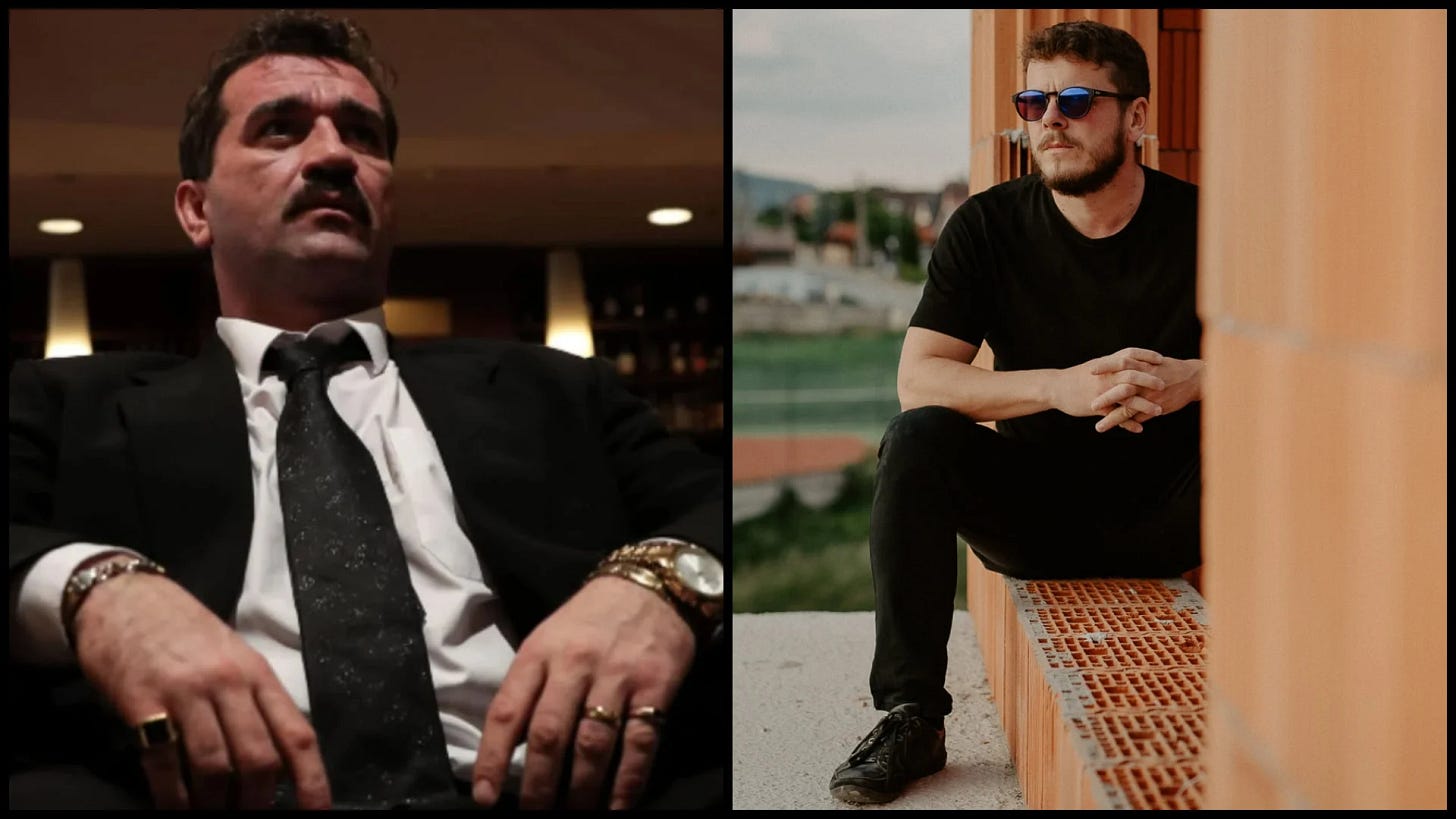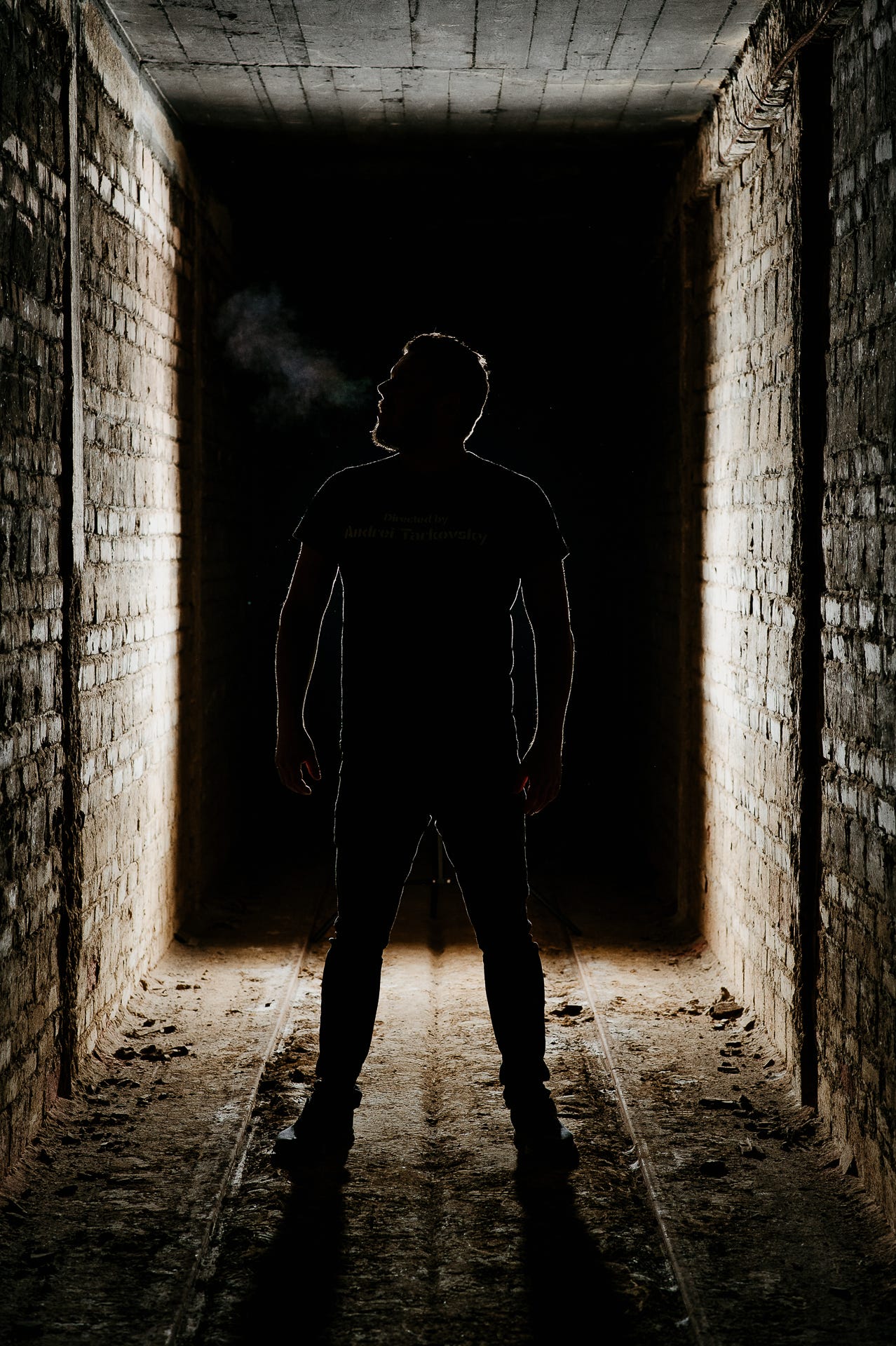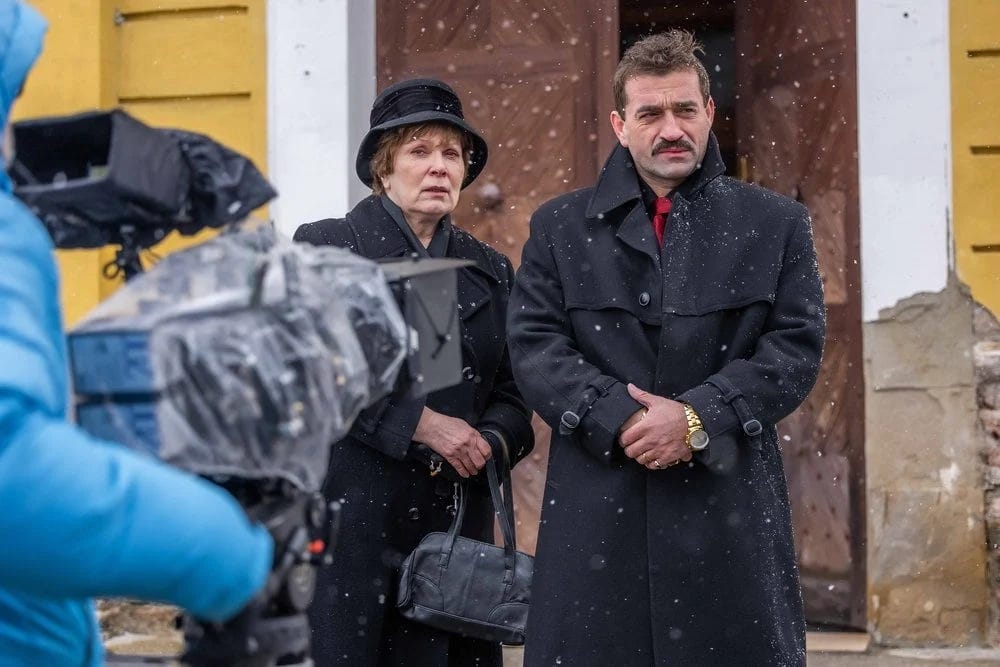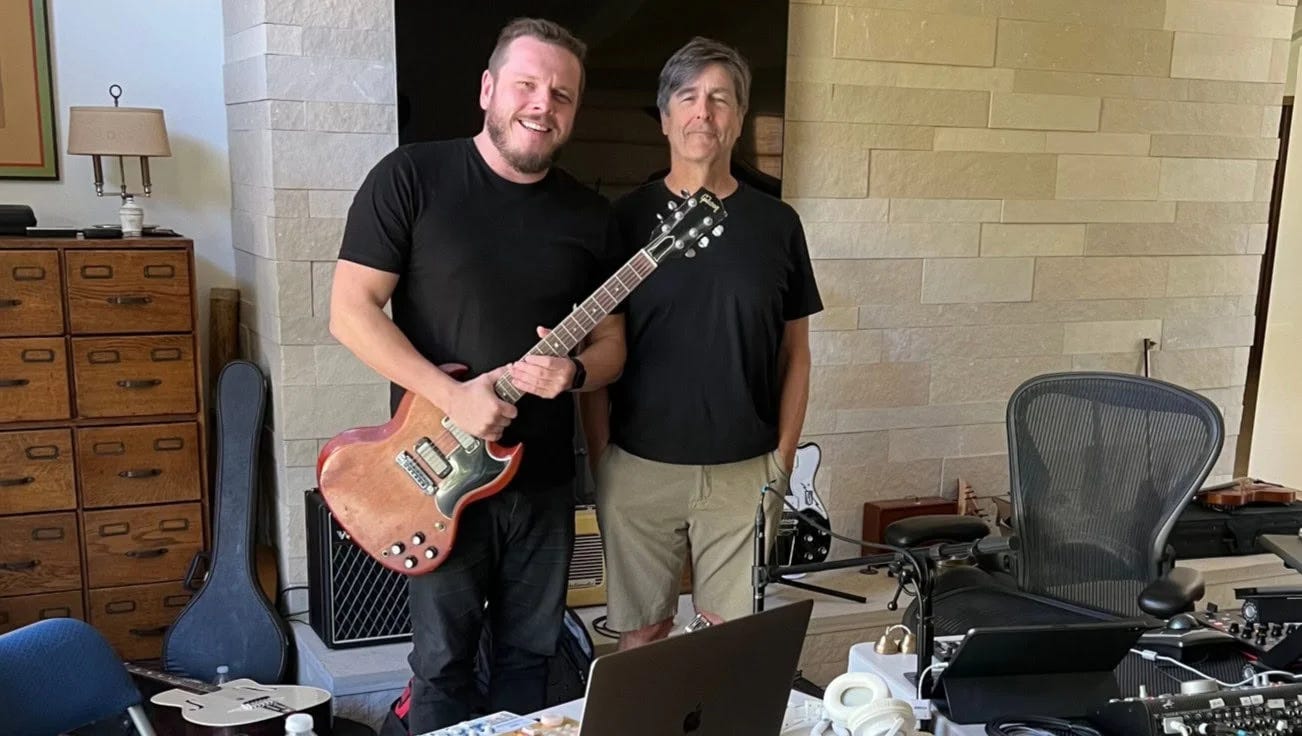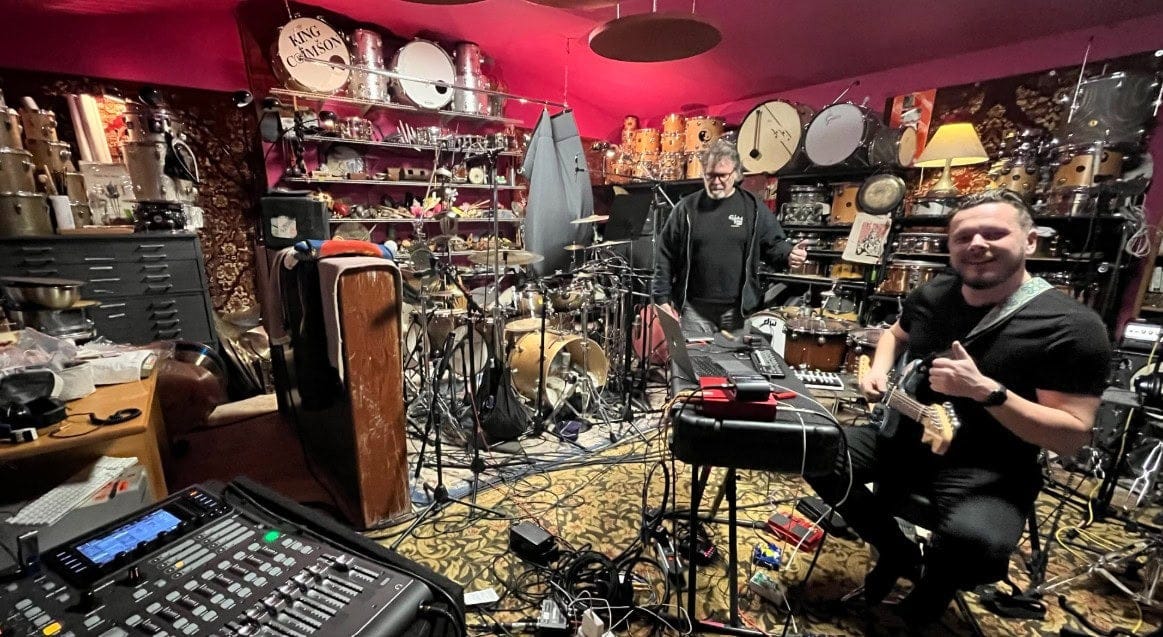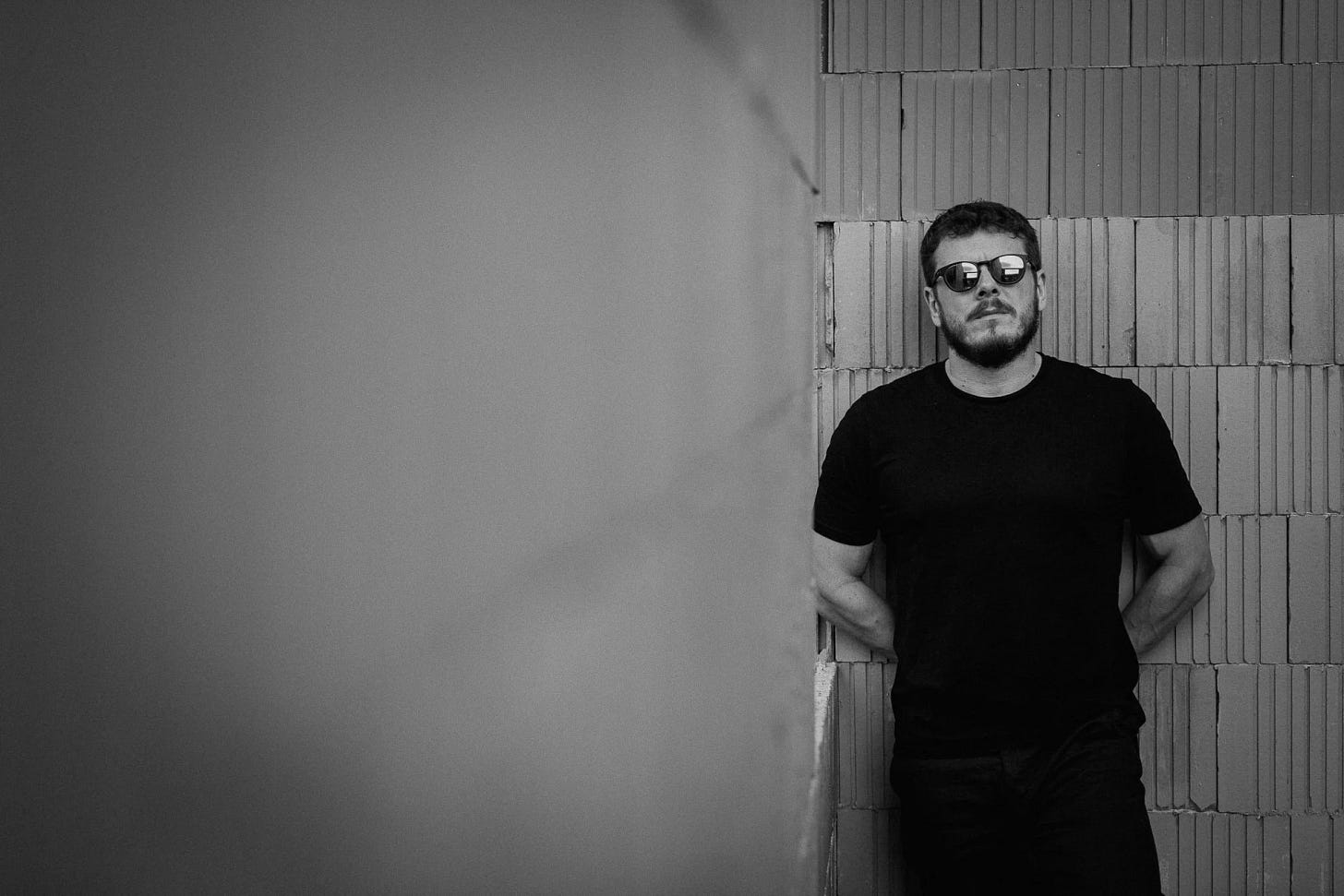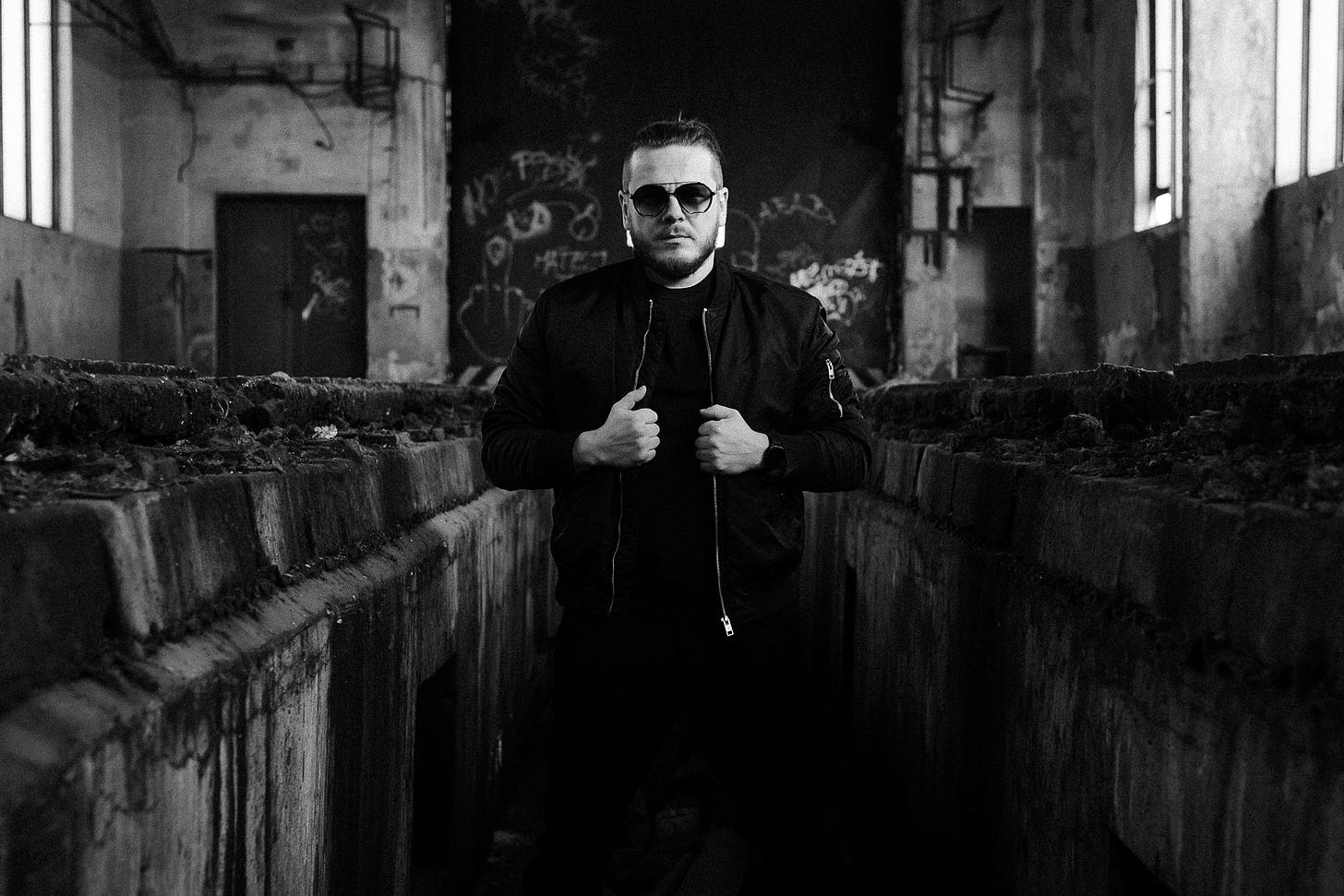Scoring Crime and Reality: Behind the Music of MIKI and ČERNÁK.
This is an interview originally published by FonTech, a Slovak portal, where I discuss my experience composing music for the films MIKI and ČERNÁK — two of Slovakia’s most successful and controversial crime dramas. I talk about the creative challenges, the backlash, and my journey from Slovakia to recording sessions with legendary musicians in Los Angeles.
In contemporary Slovak cinematography, there is no greater phenomenon than the films MIKI and ČERNÁK directed by Jakub Kroner.
These two movies about the most infamous Slovak crime boss of the 1990s captivated hundreds of thousands of viewers with their gritty atmosphere, uncompromising storytelling, and star-studded cast, earning a spot among the most successful Slovak films of all time in terms of box office performance.
A significant part of the success of these mafia dramas lies in the music, composed by one of Slovakia’s most renowned film composers, David Kollar, whose score perfectly enhanced the chilling atmosphere of both stories. Kollar has worked on more than twenty feature films and regularly collaborates with musicians from all over the world. He also runs his own podcast focused on creativity, inspiration, and the behind-the-scenes world of music life.
In an interview for FonTech.sk, the talented composer from Prešov talks about the challenges he faced while composing the music for MIKI and ČERNÁK, and how working on these films brought him unexpected difficulties. He also openly discusses his journey from a small town in Slovakia to the USA, where he worked with several world-renowned musicians, including a personal recording session in the studio of legendary composer Thomas Newman, known for his work on Oscar-winning films like The Shawshank Redemption and American Beauty.
You’ve composed music for more than twenty feature films, but the wider public started to notice you more after the success of MIKI and ČERNÁK. How did your collaboration with director Jakub Kroner begin?
The collaboration with director Jakub Kroner started thanks to sound engineer Lukáš Kasprzyk, with whom I had worked on several film projects. He sent Jakub a few of my albums, and some of my tracks eventually appeared in shows like Lokal TV, First World Wave, and Second World Wave. Shortly after, I performed live at the Lumière cinema in Bratislava with French trumpeter Erik Truffaz. We were playing a live soundtrack to the silent movie Jánošík from 1921.
I composed the music in a style I would describe as "Blade Runner-esque" — layered, dark, with electronic textures and a tense atmosphere. Coincidentally, Thomas Newman had seen a recording of that concert on YouTube shortly before. Jakub was also in the audience that night.
Later, he attended my concert for the film Punk’s Not Dead! and the next morning we met for coffee. He asked me if I would be interested in composing music for the MIKI and ČERNÁK projects. The dark themes felt close to me — both musically and personally. I didn’t hesitate long. I accepted it as a natural challenge.
Was it the biggest challenge of your career so far?
Yes, without a doubt. Not because of the budget or the size of the production, but because of the weight of the topic and its social significance. I’m a fan of series like Narcos, and since Slovakia has its own criminal past, I accepted the task with great respect and responsibility. Working on the scores for MIKI and ČERNÁK took me into dark corners — not only of society but also within myself. It was an intense and deeply personal experience.
I was very aware that the music couldn't just be background noise. It had to carry emotion and reflect reality — a story that still hurts many people here. Opportunities like this are rare in Slovakia, and I couldn’t refuse it. Overall, I lived with this project for about a year and a half — thinking, experimenting, composing, refining, searching for sounds, and creating tension between the tones.
Many positive reactions to the films specifically mentioned the music, saying it greatly deepened the chilling atmosphere of both stories. Was this the kind of story and mood that suited you best?
Yes, this kind of story came to me very naturally. I’m drawn to darker music — to sounds that are not comfortable or polished but carry tension, discomfort, and unpredictability. In music, I’m always searching for originality, for sounds where you can feel the author, something personal and inimitable. I tried to create a musical layer that would carry the inner world of the main characters.
I was looking for specific, sometimes even raw noise that would align with the dark side of the characters and highlight their psychological depth. The music is really felt throughout the films. There was also a strong emotional layer. The character of the mother in the film, I think, resonated with many Slovak women — mothers who, even though their sons ended up behind bars, still love them. I wanted the music to be not just an addition, but also a storyteller.
You hinted that you experimented a lot while working on the films. In what ways?
I mostly experimented with guitar effects, but I didn’t stop there. I started applying them to everything — bass, ukulele, drums, even synthesizers. I also played with noise, ambient sounds, different rhythms, and disrupted dynamics, sometimes getting down to the tiniest details. I recorded all the instruments myself. For me, the music wasn’t just a background — it was a full-fledged character in the film.
Besides guitars and cymbals, I used various rhythmic sounds — banging, scraping, anything that could contribute to the atmosphere. In the opening scene of MIKI, the drums are played by my long-time musical brother, Gergő Borlai.
For ČERNÁK, I recorded the drums in Texas. I set my laptop on the ground, played scenes from the film, and recorded the drums with just one microphone, playing live to the picture. At the time, I was finishing my international project KOMARA, which we will be touring with this June across Slovakia and the Czech Republic. During breaks, I used the time to work on the soundtrack for ČERNÁK.
Černák broke box office records in Slovak cinemas. Why do you think Mikuláš Černák’s story is so attractive to audiences?
Because it concerns us directly. It’s not a story from Hollywood — it’s from our streets, our towns, and villages. Many people still vividly remember those times — the extortion, the violence, the fear when bad things happened and everyone stayed silent. That feeling of helplessness and societal chaos remains with us. Černák, despite everything, had something that people sensed — charisma, authority.
In a country where many people still don’t believe in the system, that leaves a strong impression. I think there’s a deep-rooted unwillingness here to blindly follow orders or trust authority. After the revolution, there was anarchy; the state was weak, and people had to figure things out on their own. It was a time when many realized that truth and justice don’t come automatically.
English subtitles
Do you also see parallels between Černák’s story and today’s world?
Absolutely. Černák’s story reminds us of that reality and confronts us with it. Even today, we see similar absurdities — corruption broadcast live, leaked recordings from government offices and private meetings, all available on YouTube. Yet society often just watches, reacts briefly, and then moves on. That’s why many people find parallels between Černák’s story and today’s reality.
It’s not just the story of one gangster — it’s a reflection of a country that for a long time didn’t know, and maybe still doesn’t know, how to stand up to evil. And ultimately, people have always been fascinated by dark characters. Just look at Breaking Bad — we root for Walter White even though we know we shouldn’t. But life is complicated.
Both films sparked strong emotions in Slovakia, and the creators faced a wave of hatred from part of the public. Did you feel it personally as well?
Yes, very personally. I lost a few friends. I received messages like, “With this film, you’ve destroyed yourself politically; you’ll never get another cent from the state,” or “I’m ashamed of you — I thought you were smarter.” There were also random encounters on the street with comments like, “Was this really necessary?” — and the looks said even more.
I once asked one of these people if they were religious. They said yes. I pointed out that the Bible is one of the bloodiest books in the world. Every mass is about battling evil, temptation, sin, guilt, sacrifice, and forgiveness. Yet when someone here makes a film about evil, people get outraged. So what’s the alternative? Should we stop talking about the devil and pretend he doesn’t exist so that evil simply disappears?
Some people argue that films like this glorify violent criminals. How do you see it? Should the media avoid giving such figures attention?
We need to talk about these things. Look at Narcos. One episode probably had the same budget as the entire MIKI and ČERNÁK films combined. Yet Pablo Escobar is a character that many people find sympathetic — whether it’s the way he speaks or his defiance of the system. In the series, people root for him, even though he’s a negative figure responsible for countless deaths.
I don’t think finding a character sympathetic means endorsing everything they did. It’s a real story that happened. And it reveals many layers — politics, corruption, living conditions, the level of education. It all started the same way it did here: with poverty, weak education, no prospects, and corruption.
If we avoid these topics just because a character seems too intriguing, we’re lying to ourselves — and history will repeat itself.
Some people argue that films like this glorify violent criminals. How do you see it? Should the media avoid giving such figures attention?
We need to talk about these things. Look at Narcos. One episode probably had the same budget as the entire MIKI and ČERNÁK films combined. Yet Pablo Escobar is a character that many people find sympathetic — whether it’s the way he speaks or his defiance of the system. In the series, people root for him, even though he’s a negative figure responsible for countless deaths.
I don’t think finding a character sympathetic means endorsing everything they did. It’s a real story that happened. And it reveals many layers — politics, corruption, living conditions, the level of education. It all started the same way it did here: with poverty, weak education, no prospects, and corruption.
If we avoid these topics just because a character seems too intriguing, we’re lying to ourselves — and history will repeat itself.
At that time, was film music already something you wanted to pursue more seriously?
I was fascinated by film music, and I believed that my unconventional and highly atmospheric approach to the guitar could catch the attention of someone like Hans Zimmer. At that time, he was looking for new musicians with unique sounds.
I went to the door of his studio in Los Angeles and said into the intercom that I had a meeting scheduled with Hans Zimmer. I mentioned his collaboration with the Sendrei family on the Sherlock Holmes soundtrack.
A security guy came out. Instead of kicking me out, we had a conversation. He told me that no one had ever come there with that kind of courage. Hans, however, was in London at the time. Still, I promised myself that one day I would return — this time with an invitation. It was the last day of my U.S. tour.
With legendary Thomas Newman
After returning to the U.S., you collaborated with several world-renowned musicians and even had a brief encounter with the legendary Thomas Newman, known for his work on Oscar-winning films like The Shawshank Redemption and American Beauty. How do you remember that experience?
During the pandemic, I started collaborating with Rick Cox, a musician from Los Angeles known for his long-standing work with Thomas Newman. After two months, Rick casually mentioned that he was heading to the studio to work with “Thom” on a film with Denzel Washington. I asked, “Who’s Thom?” and he calmly said, “Thomas Newman.” He’s been collaborating with him on almost every project since 1984.
Rick suggested I send over a selection of my music. I sent him some CDs, which he passed along to Thomas. A few days later, Thomas agreed and said that if I was ever in Los Angeles, I should come to the studio. For me, it was a quiet form of validation after years of hard work.
When I arrived in Los Angeles, I felt a huge sense of responsibility. I prepared a palette of sounds I could create with the guitar. Thomas came in, shook my hand, and said he was happy to finally meet me. It turned out that during the pandemic, he and Rick had watched a livestream of my concert for the film Jánošík from Martin, Slovakia. That’s when I realized — it’s not about how many people are watching; it’s about who is watching.
In one of your blog posts, you mentioned that there was a small improvisation session with Thomas Newman. Can you describe how that meeting unfolded?
His technician, Moi, set up a transformer so I could use my European equipment, converting 110 to 220 volts. We started playing, and everything was recorded. After a while, we took a coffee break, I told them about Slovakia, and then we continued playing for over an hour. Thomas was incredibly humble.
Every Thursday, he and Rick meet up to improvise and record everything — it’s their way of staying in creative shape. After this amazing session, Rick and I went back to his place and continued talking about music, life, and creativity. He even lent me a bike, and I rode down to Santa Monica, all the way to Hans Zimmer’s studio.
Did you manage to meet Hans Zimmer this time?
There was a big BMW parked outside, and for a moment, I thought he might be there. But after what I experienced with Thomas Newman, I no longer felt the urge to approach Hans. Several musicians had told me that his studio works more like a factory, with a large team of people working under his name.
A cleaning lady came out and asked if I was looking for someone. I said I had just been at a session with Thomas Newman and was wondering if Hans was around. She knew who Thomas was but said that Hans was in London, rehearsing for a tour.
Štúdio Pata Mastelotta v Texase
Two days later, Thomas invited you for another recording session. How did that go?
Yes, two days later, Thomas invited me again for a friendly session. Rick and I later listened to what we had recorded, and the idea came up to maybe one day do a European tour together — intimate performances based on improvisation and atmosphere. We’re slowly starting to plan it.
That experience showed me that there are no gods on Olympus — just hardworking people. And it’s precisely their humility that makes them masters.
Your music often defies traditional genre classifications. How would you describe it to someone who has never heard it before?
Some people call it genre-less music — and there’s probably some truth to that. Each of my albums is different — a different sound, a different concept, a different energy. I’m a very curious musician. I want to go where no one has gone before, or at least where few have ventured.
I create music to be honest. I don’t think about whether people will like it, how many views it will get, or how it will be categorized. I don’t want to play by the rules made for clicks and algorithms. I want to do things properly — in my own way — with a focus on sound, layering, and atmosphere. I don’t want to produce mere products; I want to create statements.
What does your creative process look like? Do you have any rituals when composing music, or do you create more spontaneously?
I create more spontaneously. I don’t have rituals, but I have discipline — I work on something every day. Sometimes I start with just a single sound or detail that captures my attention or disturbs me. From there, everything unfolds. I record something, listen to it over and over, layer it, erase parts, and search for the right feeling. It’s a constant motion, long hours every day.
For MIKI and ČERNÁK, I even worked off the script. I imagined the scenes before they were even filmed and created musical sketches — most of which eventually stayed in the final films.
Do you have complete creative freedom when composing film scores, or do you sometimes have to compromise?
Film is a team effort. I will never see the film the same way the director does — they’ve lived with the story for months, sometimes years. I come in as a musician, bringing my emotion and musical perspective. Sometimes these worlds align immediately; other times it takes a bit longer. But that’s what makes it interesting.
Darth Vader’s breathing was recorded through a scuba regulator, and the T-Rex roar in Jurassic Park was a mix of sounds from an elephant, a lion, and even a Jack Russell terrier. Have you ever used similarly unconventional improvisations in your composing?
Definitely, but mostly with sounds from my own instruments — things no one would ever recognize. I love manipulating and reshaping the natural sounds of instruments in ways that make them untraceable.
You also composed music for Immortalitas, which was presented as the first Slovak sci-fi film, but the final result was not what people expected and is now considered one of the worst-rated Slovak movies. How do you look back on that experience? Was it a mistake or a valuable lesson?
I have a friend who says, “If you can't handle small gigs, you'll never be able to handle big ones.” And there’s something to that. I always wanted to compose film music. With my own music, I had already traveled the world and collaborated with top musicians, but when it came to film scores, I had to start somewhere.
That’s why I began making short films — just to have something to write music for. It was my way of creating my own practice ground. The director of Immortalitas, Erik, was from Prešov. First, we worked on short films where I played murderers, writers, and similar roles. I also organized the Bastion Film Festival in Prešov, where director Miro Remo came. I played live scores to children’s short films, we had a beer afterward, and that’s how our collaboration started.
Later, Erik went to the Academy of Performing Arts and started working on a post-apocalyptic short film — which eventually turned into the full-length Immortalitas. Even today, I joke that the film should have ended with students waking up in a dorm room and saying, “What a crazy dream that was!” But Erik took it very seriously.
Immortalitas was the beginning of my journey. I’m not ashamed of it. At that time, I definitely wouldn’t have been ready to tackle a project like MIKI. Today, I can look back at it with a smile. Recently, I rewatched it with my son, and we laughed a lot. It’s a bit like the 2008 parody Meet the Spartans — something so bad it becomes funny.
Which film composers have influenced or inspired you the most?
Honestly, I’m more inspired by non-traditional composers — musicians who are invited into the world of film, just like I was. I don’t really consider myself a typical film composer who works on ten TV series at once, fitting into the usual mold of what film music is supposed to do.
I love when people like Jonny Greenwood from Radiohead compose film scores — his music has character and edge. I also admire the German composer Volker Bertelmann, also known as Hauschka, who won an Oscar for All Quiet on the Western Front. These kinds of composers are often more original in film than traditional craftsmen.
I have great respect for Trent Reznor from Nine Inch Nails and his collaborations with Atticus Ross — their work is brilliant and inspiring. I also love Ennio Morricone — his musical language, his ability to work with melody and contrast. And, of course, Thomas Newman, whose compositions continue to be a constant source of inspiration for me.
The films MIKI and ČERNÁK showcased your ability to work with dark and dramatic atmospheres. Would you ever want to try something completely different, like composing for an animated film or a comedy?
Honestly, I would be interested — but only if the film had real depth. I wouldn’t want to write cheerful music just for the sake of it being a comedy. If someone asked me to score a romantic comedy, I’d probably struggle a lot with it.
Maybe I could sneak in some melancholy, but it would likely end up being something strange — like love meeting the end of civilization. An animated film could be fascinating because you can create an entirely new world through sound. I wouldn’t want to jump into something like Shrek 5, but a poetic, quirky, slightly odd animated movie — that would really attract me.
Are you currently working on any projects that you can share with us?
I’m not working on a film at the moment. Honestly, I feel like some filmmakers distanced themselves from me after MIKI and ČERNÁK — maybe they had an issue with the films. I don’t really understand it.
I’m hoping these films will soon be available on Apple TV, and then I plan to head back to the U.S. to reconnect with Thomas Newman and Rick Cox. Maybe find an agent and slowly start working internationally again. I don’t want to stand still and wait for something to happen.
In the meantime, I released an album called CALLS, which captures phone conversations and feelings of frustration with top European musicians. This June, my international project KOMARA will be released — a collaboration with drummer Pat Mastelotto from King Crimson, Trey Gunn from King Crimson, and Italian trumpet player Paolo Raineri. I also finished my third book, 7 Days to a Better Musician. When I’m not making music, I paint abstract works inspired by my music, record podcasts, and write blogs — all in two languages. I’m always searching for new ways to express myself and avoid getting stuck.
In the past, Hans Zimmer discovered Romani musicians in Slovakia and recorded with them for the Sherlock Holmes soundtrack. Do you think it was an exceptional event, or does Slovakia still have strong musical potential for such collaborations?
Let’s be honest — Hans Zimmer was looking for a Romani band for a battle scene with Romani characters in Sherlock Holmes 2, and he found one in Slovakia. That wasn’t a coincidence — it was proof that the talent really exists here.
The potential is strong, but many artists are stuck in their own circles. They travel little, collaborate little, and they don’t seek out better players to grow alongside. Another issue is support.
We have to realize that people like Hans aren’t looking for commercial musicians — they’re searching for innovators, musicians with an interesting approach. And while you’re working on originality, you need to survive somehow. Sure, you can perform or teach on the side, but you know what I mean — if we want to support these artists, we need to create real opportunities. It’s not enough to tell them to work hard and be original; they need to feel it’s worth it to walk their own path.
In the past, Hans Zimmer discovered Romani musicians in Slovakia and recorded with them for the Sherlock Holmes soundtrack. Do you think it was an exceptional event, or does Slovakia still have strong musical potential for such collaborations?
Let’s be honest — Hans Zimmer was looking for a Romani band for a battle scene with Romani characters in Sherlock Holmes 2, and he found one in Slovakia. That wasn’t a coincidence — it was proof that the talent really exists here.
The potential is strong, but many artists are stuck in their own circles. They travel little, collaborate little, and they don’t seek out better players to grow alongside. Another issue is support.
We have to realize that people like Hans aren’t looking for commercial musicians — they’re searching for innovators, musicians with an interesting approach. And while you’re working on originality, you need to survive somehow. Sure, you can perform or teach on the side, but you know what I mean — if we want to support these artists, we need to create real opportunities. It’s not enough to tell them to work hard and be original; they need to feel it’s worth it to walk their own path.
How has the life of a musician changed in recent years with the rise of streaming services, social media, and artificial intelligence?
It’s changed drastically. Streaming services have devalued music almost to zero. Music today is like tap water — it’s everywhere, constantly flowing, but no one really thinks about what’s behind it. People can’t even tell anymore what good water and bad water taste like.
Social media has created pressure to always be visible. It’s not enough to make good music — you have to be a marketer, a cameraman, a host, and an entertainer too.
Don’t you sometimes feel tired of this constant pressure to be “present” and “interesting”?
I don’t like it, but that’s the reality. It’s hard to capture a young person’s attention today with something serious in under ten seconds. If it doesn’t explode or shout, they’ll just scroll past it.
There’s enormous pressure for instant reaction, not deep experience. That’s why in my book 7 Days to a Better Musician, I included a lesson encouraging people to listen to an album from start to finish — as if they could only listen to it once in their life.
And now we have artificial intelligence, which can generate music in seconds. It’s music without a soul or a story, but it’s fast and cheap. For some, it’s a tool — but for a musician who has spent years finding their own voice, it’s a challenge. Authenticity now matters more than ever — the things a machine can’t create: humanity, imperfection, unpredictability.
NOTE
If you’re interested in watching the films but they are not available in your country yet, there are ways to find versions with English subtitles online. Hopefully, they will officially expand their availability soon.
MIKI FILM - https://uflix.cc/movie/miki-2024
ČERNAK film - https://uflix.cc/movie/ernk-2025


